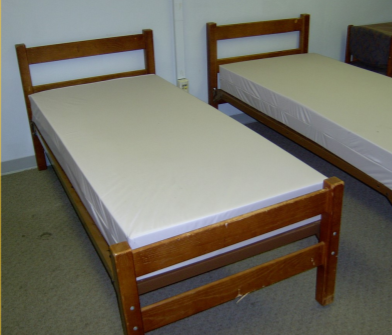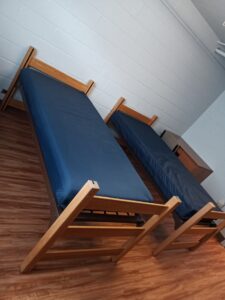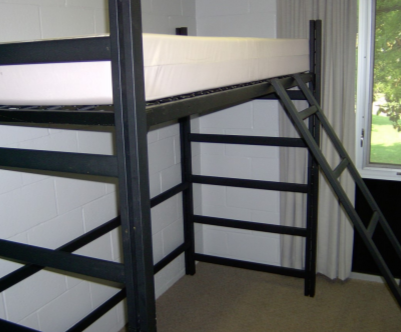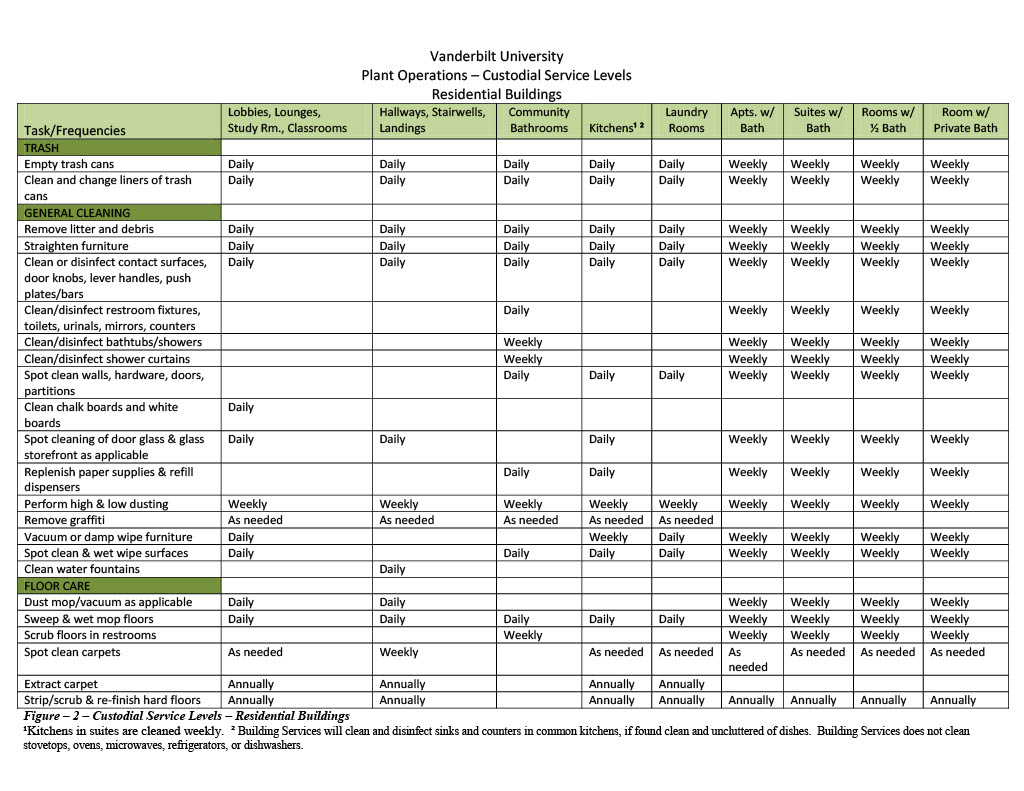Housing Facilities
Service & Repair/Safety & Security/Room Condition/Amenities and Furnishing/Facilities Programs
Service & Repair
Housing Facilities Services
Each residential area has a maintenance professional, Housing Facilities Supervisor (HFS), charged with overseeing residential maintenance, repair, renovation, and construction. The HFS is the go to person for building needs, including plumbing, electricity, heat and air conditioning, furniture, and housekeeping.
To report routine residence hall needs, submit a request in ReADY here. Requests made nights and weekends will be addressed the following business day. Immediately report to residential staff any issues that endanger health, safety, or the building structure. Call emergency immediately for fire and life threatening situations.
Each residential area has a supply of vacuums and mallets available for residents to use. Ask your area staff about check-out of these items.
Outages Notices
The interior and exterior structure of the buildings, the doors, electrical systems, plumbing, heating and cooling systems, elevators, the carpet, and the paint are part of the total scope of maintaining the buildings.
Housing Facilities is concerned with items that affect the residents’ safety and building structure. These include overflowing toilets, water valves that are stuck open, broken glass, biohazards, exposed electrical wiring, exterior doors and windows that will not secure, student room doors that cannot be locked, and lights that do not work.
Official notices will be provided in the event of power, water, or other outages, as well as any scheduled work in or outside the residence hall that will directly affect the residents. These notices may be posted in bathrooms, on doors, and in elevators as necessary to properly notify residents. Pay close attention to notice details and alter your schedule accordingly to reduce the chances of property damage.
Doors are for official notices only. Postings for student and community activities are restricted to bulletin boards. Anything other than an official notice found posted anywhere but a bulletin board will be removed on site.
Building Services
Dumpsters and recycling containers are conveniently located for your use. Please follow instructions on posted signs or materials provided to you. Refer to the building services schedule and details that follow.
IT Services
VUIT
Xfinity On-Campus IPTV Service
VUPrint
Each residential building has a printer connected to the VUPrint network. For more information, visit the VUPrint page here: https://vuprint.vanderbilt.edu/
Vending
Dining Services provides vending machines across campus. If you need assistance with a machine, use the contact information on the vending machine. If you need additional assistance, contact Campus Dining.
Laundry
Residence hall laundry machines are free for hall residents. Visit the vendor’s page for special instructions. If you need to report machine issues, follow the directions posted in the laundry room. Below is a list of laundry locations across campus.
|
The Commons |
Main Campus | ||
| Crawford | Crawford Floor 1 | Warren & Moore Colleges | Warren Basement & Moore Floor 1 |
| East | Crawford Floor 1 | E. Bronson Ingram College | EBI Basement |
| Gillette | Gillette Floor 1 | McGill | EBI Basement |
| Hank Ingram | Hank Ingram Floor 1 | Cole | Lupton Basement |
| Memorial | Stambaugh Floor 1 | Tolman | Tolman Floor 1 |
| Murray | Murray Floor 1 | Nicholas S. Zeppos College | Zeppos Basement |
| North | West Floor 1 | McTyeire | Lupton Basement |
| Stambaugh | Stambaugh Floor 1 | Branscomb Quad (Lupton, Scales, Stapleton, Vaughn) | Lupton Basement |
| Sutherland | Sutherland Floor 1 | Blakemore | Blakemore Floor 1 |
| West | West Floor 1 | Highland Quad (Chaffin, Mayfield, Lewis, Morgan) | Morgan Basement or Lewis Basement |
| Rothschild | Rothschild Lower Level | ||
Safety & Security
Access
Each Vanderbilt student is issued a Commodore Card that serves as a student ID, allows cash free purchases at on-campus and off-campus locations, grants free rides on public transportation, and authorizes access to appropriate campus buildings.
Our Commodore Card access system, now available on Android, iPhone, and Apple Watch, controls students’ access to:
- Residence hall through the building’s designated main entryway, 24 hour a day, 7 days per week
- Stairwells and elevators within the residence halls so that only building residents can access their residence hall’s floors
- Buildings where students’ classes are held.
For more information about the card access system, including how to report a lost or stolen card, go to vanderbilt.edu/commodorecard/students.html.
If you cannot access a location that you feel you should be able to enter, report the problem to the Area Coordinator for your residential area.
Do not loan your card/phone to anyone, and do not use anyone else’s card/phone.
EMERGENCIES
To help keep residents, faculty, and staff safe, adherence to these guidelines is crucial.
- Keep corridors clear.
- Do not cover smoke detectors.
- Candles, halogen lights, fireworks, and appliances with an exposed heating element are prohibited.
- Grills are prohibited on patios and balconies.
See the University’s Emergency Guide for information on responding to fires, natural disasters, and other emergency situations.
DOORS
Always Lock Your Door!
- Lock your door whenever you lose eye contact with it.
- Always carry your keys and Commodore Card with you. For your safety, carry them in separate places, NOT on a key chain together.
- If you lose your key, contact your RA immediately.
- If you lose your Commodore Card, contact the Card Office (2-2273) or Dining Service Outlet immediately. You can also deactivate your lost card online at https://www.vanderbilt.edu/cardservices/
- Do not use emergency exits unless the building evacuation alarm sounds.
- Do not prop doors open.
- Do not hold doors open for individuals you do not know.
- Report suspicious individuals to the Vanderbilt University Police Department, your RA, or the information desk.
- All visitors must be escorted into and out of the building.
- Do not give combination door codes to anyone.
- University staff working in residential rooms will lock the door when exiting.
- Pick-up your replacement key at the front desk of your area.
SAFETY
AlertVU
VU Public Safety
Back to the Top
Room Condition
University Policies
Refer to the Student Handbook for General Residence Life policies on maintaining your room, motorized transportation, pets, and more.
Clean and Healthy Space
Please adhere to the following guidelines:
- Do not leave any food uncovered.
- Store food in bags or containers with tight lids.
- Empty trash regularly.
- Clean stovetops, ovens, and refrigerators regularly.
- Remember: Bugs live only where there is something for them to eat!
- Do not cover the motion sensor in the private bathroom.
Keep your environment free from mold and mildew:
- Do not open windows, especially during extremely humid weather.
- Keep bed away from windows.
- Do not place furniture or storage in front of or on top of A/C unit.
- Do not allow wet, damp clothing or linens to accumulate in room.
If there is any sign of condensation or bugs in your room, please call your Housing Facilities Supervisor immediately.
Damages
- NO hanging anything on sprinkler heads or pipes. This damages heads and can
cause floods. Students damaging sprinkler heads will be financially responsible
for all associated damage, both university property and student property. - NO “over-the-door” hanging racks. These brackets damage doors and
door frames. - NO dart boards. They are against university policy.
- NO screws or nails. They damage all surfaces.
- NO adhesive or duct tape on doors, trim, carpeted surfaces, ceilings, floors,
or walls. Use only white “Hold It” or “Plasti-Tak” putty.
“Pictures and bulletin boards may be hung only from the picture rail where present.
Scotch tape, staples, adhesive holders, screws, brackets, tacks and nails are not to be
used on the painted walls, woodwork, floors, ceilings, or doors. Hooks for picture rails
may be purchased in the University Bookstore.”
“Push pins and thumb tacks have been approved on vinyl wall coverings in student
rooms only. Nails are not to be used any place, at any time.”
Damage Claims – If you experience damage to your personal property, please contact your renter’s insurance provider. All on-campus residents are required to carry renter’s insurance.
Decoration Guidelines
Residents must abide by the fire safety practices and regulations listed below:
- Candles, oil lamps, and incense are prohibited in the residence halls whether burning or not.
- Flammable materials may not be used in decorations. All materials must be fire retardant (proof shown by label).
- Decorations may not cover or obstruct light sources, heating/cooling sources, fire safety fixtures (sprinklers, smoke detectors, fire strobes, horns, or pull stations), access and security devices (card readers, cameras), air vents, electrical outlets, light switches, or fireplaces
- Access to windows and doors must be kept clear for emergency egress.
- Decorations should not block passage through a hall.
- All exit signs and exits should be visible and recognizable. No exit signs may be covered.
The following are prohibited:
- No more than three strands of approved lights may be strung together and must be plugged directly into an outlet or into a surge protector that is plugged directly into an outlet. Lights are not to exceed 100 watts per outlet.
- Items suspended from the ceilings, ceiling grids, ceiling tiles, light fixtures, overhead piping, or on or near water pipes.
- Items suspended from or attached to sprinkler heads.
- Real trees and greenery.
- Artificial snow and frost may not be used on the windows or elsewhere in the residence halls.
The following items are acceptable:
- Only UL approved tube lights and string lights are permitted.
- Artificial flame-resistant trees, garland, etc.
- Doors may be decorated. Decorations may cover no more than 50% of the door surface, and room numbers must remain visible.
Common areas may be decorated for 10 days. Decorations must be removed after 10 days or prior to periods when halls/houses are closed, whichever comes first.
- Any structure built must be at least four (4) feet from any wall at all points.
- No structures can be built with the intention of using it as a walkway, i.e. no bridges.
- The maximum length for string lights is 75’. (Follow the guidelines for lights listed above.)
- An 18” clearance from sprinkler heads is required.
- Decorative wall and door coverings (ex. wrapping paper) must be fire retardant.
- Not more than 30% covering on corridor walls.
- Decorations are subject to approval by the Housing Facilities Supervisor. Submit your plans to your Area Coordinator for HFS approval. Plans must include a list of:
- all products and materials to be used;
- how they will be displayed; and
- how they will be supported.
- All decorations and materials must be removed no later than 10 days after they were installed, and the area left cleaner than you found it.
Weather
Changing Seasons
Changing seasons bring about fluctuations in daily temperatures. As a result, the heating cooling systems of the halls will switch from cooling to heating depending on the outside temperature. Keep your windows closed due to condensation problems caused by humidity. Furthermore, open windows can cause unbalanced temperatures through the building.
Excessive Rain
A sudden downpour may overwhelm drains and downspouts, while a sustained period of rain may produce flooding in low lying areas. Immediately report any leaks or wet indoor areas.
Freezing Temperatures
During winter months the outdoor temperature can fall below freezing. An extended period of freezing temperatures can cause pipes to freeze and bust. Keep your windows closed, especially when you’re away from your room. If the window is left open and the pipes of your fan coil unit freeze, you will be charged for damage and clean-up resulting from busted pipes.
Back to the Top
Amenities and Furnishing
University Policies and Our Residences Halls
Per the Student Handbook, University furniture may not be moved. It must remain in assigned spaces. Refer to the Student Handbook for General Residence Life policies on furnishings. Specific amenities and furnishings for each building are listed under “Our Residence Halls.”
BEDS
Bed Types:
Standard Twin Beds:
(Shown side-by-side)
These fixed height beds are made of wood. They can be bunked. Bed raisers, for sale at the bookstore, will give inches of additional under bed space. Ask for risers for square bed legs. Available in Scales (corridor rooms).

Junior Loft Beds:
(Shown side-by-side)
Made of wood, these are shorter height adjustable beds. All the needed pieces are in the room. To lower the bed, check out a mallet from the front desk. Available in Lupton, Stapleton, and Vaughn (corridor rooms).

Loft Beds: (Shown below in the full loft position)
Made of metal or wood, these may be lowered as desired. See lofting instruction online. Mallets are available for check-out from the front desks. Available in Warren | Moore, Cole, Tolman, McGill, McTyeire, E. Bronson Ingram, Zeppos, Rothschild, Branscomb Quad (end rooms only), Blakemore, Chaffin, Lewis, Mayfield, Morgan, and The Commons.

Bed Size: The standard mattress size is 78” long. Housing has a limited number of 82” mattresses for residents who are 6’4” and taller. These are issued in the order requested until the supply is depleted.
(Note: Nicholas S. Zeppos and Rothschild Colleges are equipped with 80” mattresses.)
Rails and ladders: Ladders and safety rails are available upon request at no charge. If you want either or both for your bed, please submit your request in ReADY. Log-in with your VUnet ID. Select furniture and bedrails/bed ladders. Then type in a description, such as side of room or bedding color.
How to Unloft and Loft Your Bed:
Former Housing Facilities Supervisor, Henry Murrey, guides 3 Vanderbilt students (just like you) through the process, showing you what – and what not – to do.
If you are over 6’5″ and would like to be considered for an XL bed, please contact our office at 615-322-2965.
HVAC
Facilities has prepared this information to aid you in understanding and operating the heating and air conditioning system in your building. Filters are routinely changed in residential spaces. To help with air circulation, do not position your bed against the unit. Also, be aware of how weather impacts the operation of the system. For specific details about the heating and cooling system in your building, read the information below.
Vanderbilt University currently uses two primary methods of heating and cooling. The two types
of fan coil systems available are two-pipe and four-pipe. The two- or four-pipe designation
refers to the water distribution system serving the climate control equipment in a building.
- A two-pipe system includes only one supply line and only one return line to the unit. With a two-pipe system, the entire building is in either heating mode or cooling mode. Buildings automatically switch from heating to cooling or from cooling to heating based on a pre-set thermostat that reads the outside temperature.
- A four-pipe system has supply and return piping. The four-pipe system includes a distribution system that contains both hot water supply with return lines and a chilled water supply with return lines. That means four-pipe systems can supply heat to one room while cooling another.
There are differing levels of control by building. There are halls where the resident(s) may turn the fan off or set the speed to low, medium, or high. In some buildings temperature control is available. In a few halls, the fan runs continually to keep air moving in the space. The table below describes what’s offered in each residence hall. For additional help or information, contact your Housing Facilities Supervisor.
| Two-Pipe | Four-Pipe | Fan Speed Control | Temperature Control~ | Continuous Running Fan | |
| Alumni Lawn: Cole, Tolman, McGill | X | X | |||
| Alumni Lawn: E. Bronson Ingram | X | X | X | ||
| Blakemore | X | X | X | ||
| Branscomb Quad: Lupton, Scales, Stapleton, Vaughn | X | ||||
| Branscomb Quad: End Rooms | X | X | |||
| The Commons: Crawford, Ingram, Murray Stambaugh, Sutherland | X | X | X | ||
| The Commons: East, Memorial, North, West | X | X | X | ||
| The Commons: Gillette | X | X | X | ||
| Highland Quad: Morgan, Lewis | X | X | X | ||
| Highland Quad: Mayfield, Chaffin* | X | ||||
| McTyeire | X | X | |||
| Nicholas S. Zeppos College | X | X | X | ||
| Rothschild | X | X | X | ||
| Warren & Moore | X | X | X |
~Fan must be on to control the temperature.
*Mayfield and Chaffin are heat pumps.
Back to the Top
Facilities Programs
Student Organization Donation Drives
Policy of Housing & Residential Education on Donation Drives in the Residence Halls
Carefully read all the guidelines below. Failure to comply may stall or terminate the drive.
Anchor Link Registration Form
- If you are interested in having a donation drive. Please complete this form via Anchor Link.
Locations
- University Housing and Student Centers will permit student organizations to set-up collection boxes at the following locations
- Housing Locations
- Central information desk in each residential area: Warren|Moore, E. Bronson Ingram, Zeppos, Branscomb, Lewis, Hank Ingram, and Blakemore.
- Student Centers Locations
- Commons Center front desk and Sarratt Promenade.
- Housing Locations
Period
- Only one organization at a time may set-up and operate a collection for a one-week period only, Monday morning through Sunday evening.
- The sequence of groups will be on a first come, first served basis.
- Additional drives may be approved in Student Centers locations if the type of drive is not in conflict with a previously registered drive (ex: a food drive and clothing drive may be able to happen simultaneously).
- No collections will be approved during the exam period because this is reserved for Housing’s Annual Closing Collection.
Approval
- Complete the Donation Drive Registration form in Anchor Link.
- Wait for approval before placing collection containers.
- Unapproved collection containers will be removed immediately from Residence Halls and Student Center buildings.
Signage
- The student organization must submit a flyer to the Facilities Management Office in Branscomb #1106 one full week prior to the start of the donation drive.
- The flyer should include information about the dates of the drive, the sponsoring student organization and the target charity.
- After approval, the organization may post the flyers in residence halls on bulletin boards only.
- Additionally, signage for collection containers is limited to the container itself.
Collection
- The student group must provide contact information (including cell phone) for a representative in charge of the operation.
- The group must provide a plan for monitoring collection boxes and collecting donated items.
- In the event boxes overflow, OHARE will contact the representative to arrange a pick-up of donated items.
- If there is no response within 24 hours, the items will be discarded.
Be sure to select a reputable charity!
To obtain approval to have a collection in the residence halls, call Toi Batson in the Housing Facilities Office at (615) 322-2965 or email toi.f.batson@vanderbilt.edu.
Closing Collections
Housing Facilities coordinates an annual year-end donation drive. The Closing Collection invites community partners to receive student donations during the move-out period. Details about collecting organizations, dates, and locations are provided prior to exams.
Back to the Top

